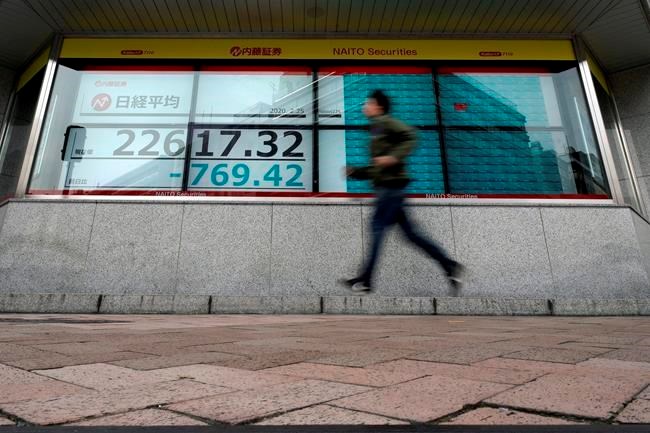LONDON — Share prices around the world, particularly in Japan, took a hit Tuesday amid mounting fears about the economic impact of the new coronavirus outbreak.
An anticipated solid opening on Wall Street provided some hope that the current bout of selling might ease.
With cases of the virus outside China rising, traders are fretting about the global implications of the outbreak. On Monday, stock indexes suffered one of their worst days in years, with the Dow Jones index on Wall Street tanking more than 1,000 points.
The mood in markets was not as bad on Tuesday but the selling momentum was clear, particularly on Japan's main Nikkei index, which slumped 3.3% to 22,605.41 after reopening from a holiday on Monday.
After a steady opening in Europe, stocks were down sharply again, with traders reacting to the spike in virus cases in Italy and Austria and Croatia reporting their first cases.
The negative news dampened the mood across European markets. Germany's DAX was 0.5% lower at 12,977 while the FTSE 100 index of leading British shares fell 0.7% to 7,105. The CAC 40 in France was down 0.5% at 5,761.
“What was largely a Chinese issue to resolve has soon become an international problem, with European eyes transfixed on Italian efforts to curb the spread of the virus," said Joshua Mahony, senior market analyst at IG.
“Fears over a potential coronavirus contagion throughout Europe is likely to provide substantial risk-off sentiment for days and weeks to come, with significant pressure on the Italians to stop this outbreak from spreading throughout the continent."
Wall Street was set for some modest gains at the bell with Dow futures and the broader S&P 500 futures both up 0.3%.
“Wall Street is still on course for a slightly positive open but given how quickly Europe has turned south, I'm not confident it will last,'' said Craig Erlam, senior market analyst at OANDA Europe.
“Perhaps investors in the US still feel a little sheltered from the direct effects of the spread at the moment but should it accelerate in Europe and Asia, I don't think they will for long."
China, the epicenter of the outbreak, faces the most acute near-term difficulties as factories lie idle and people remain homebound. But the ripple effects are being felt all around the world, as China is both a major importer of goods as well as a source of parts through intricate supply chains.
The global economy was just stabilizing after wobbles caused by the trade war between the U.S. and China and fears of a disorderly British exit from the European Union. The coronavirus hit just as a U.S.-China preliminary deal and a Brexit withdrawal divorce agreement had boosted hopes for a modest upswing, particularly in Europe.
Now the world economy could see its first quarterly fall in seasonally adjusted output since the global financial crisis of more than a decade ago.
In Asia, Hang Seng edged 0.3% higher, to 26,893.23 and the Shanghai Composite index shed 0.6% to 3,013.05. In Australia, the S&P ASX/200 shed 1.6% to 6,866.60. South Korea's Kospi rebounded from a steep loss on Monday, adding 1.2% to 2,103.61.
Benchmark U.S. crude oil lost 17 cents to $51.26 per barrel in electronic trading on the New York Mercantile Exchange, while Brent crude oil, the international standard, shed 22 cents to $55.72 per barrel. On Monday, it dropped $2.17 to close at $55.77 a barrel.
Gold retreated after hitting seven-year highs on Monday, trading 1.5% lower at $1,651.70 an ounce.
The mood was far calmer in foreign exchange markets with the euro down 0.2% at $1.0834 while the dollar was flat at 110.70 yen.
—-
Read all the AP stories about the virus outbreak that emerged from China at https://apnews.com/VirusOutbreak
Pan Pylas, The Associated Press



